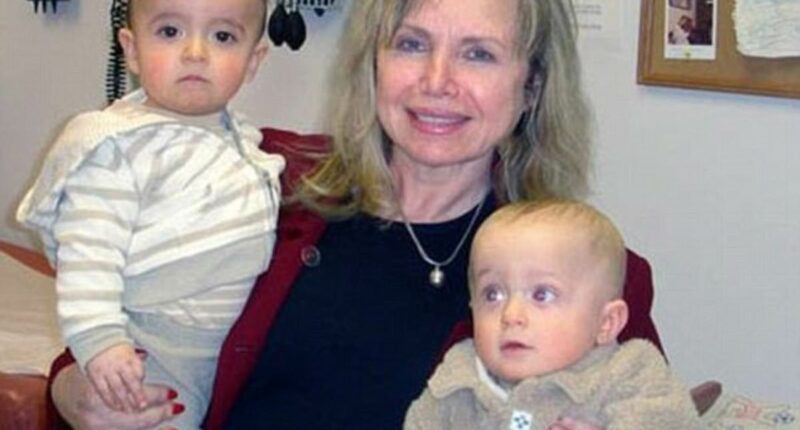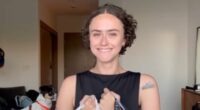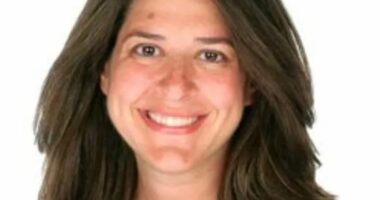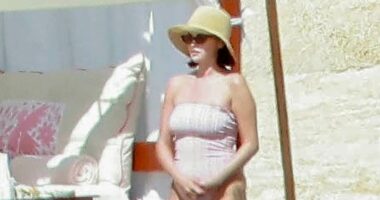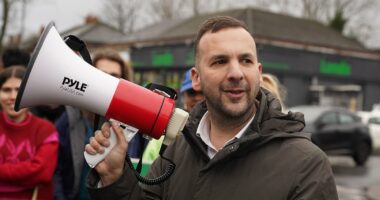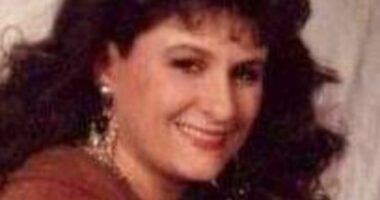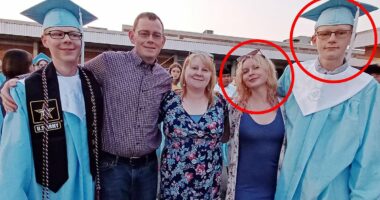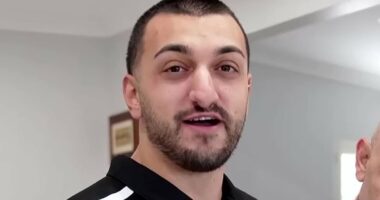Share this @internewscast.com
It was May 2007 when a New Jersey woman gave birth to two healthy boys at age 60, becoming America’s oldest known mother of twins.
Mocked in news reports as ‘the grannymom’, Frieda Birnbaum refused to apologize for daring to have kids so late in life.
The psychotherapist capitalized on her newfound fame to inspire women to consider having children later in life. She encouraged them to see this as a liberation from the anxiety of biological clocks and the negative views on aging.
Frieda said she had never felt more energized after delivering twins Jaret and Josh, now 18.
Now, at 78, as she prepares to send the twins off to college this month, she seems just as vital.
“The skeptics and critics were entirely mistaken because my sons have energized me,” she shared with the Daily Mail during a lunch with her sons, Jaret and Josh, and her 81-year-old husband, Ken.
‘Raising them has been so easy.’
The vibe at the Birnbaums’ home in leafy Saddle River, New Jersey last week wasn’t about record-breaking superlatives or reinvention.

Frieda Birnbaum (center) became the oldest mother of twins in 2007 after giving birth to sons Jaret and Josh (left and right) at the age of 60

Frieda, a psychotherapist, famously flew to South Africa and lied about her age to doctors to undergo IVF treatment, after US clinics refused
Rather, their life was filled with suburban normalcy—enthusiastically caring for their miniature doodle, Roxie, while planning who would look after her, their rabbit, four chickens, and five exotic birds when Jaret and Josh leave for college soon.
Jaret, the more organized twin, reminded his brother to fill out his stack of college forms so he doesn’t need to rush the day they’re due.
He was quick to comment on how youthful their mom appears at 78 and took the opportunity to remember their late brother, Ari, who passed away two years ago from what seemed to be a brain aneurysm at the age of 22, just a month after his college graduation.
Pictures of Ari and sympathy cards mailed after his passing still line the Birnbaums’ foyer.
They are a reminder of their collective heartbreak and a way to keep his memory close.
‘Ari was by far the nicest person in our family,’ said Jaret, who is headed to Northeastern University in Boston later this month.
Josh will attend Stevens Institute of Technology in New Jersey, Ari’s alma mater.
Josh, the more humorous and wise-cracking twin, enjoyed pointing out his dad’s struggle with his smartphone and highlighted his 5-foot-1-inch mom’s strong opinions and ‘let’s call it candidness’ with strangers.

Now at 78, Frieda (right) and her husband Ken (left), 81, residing in Saddle River, New Jersey, are gearing up to see their teenage boys off to college.

Frieda, pictured with husband Ken (left) and maternal and fetal specialist Dr Abdullah Al Khan (center) at a New Jersey hospital, made headlines and was mocked in news reports as ‘the grannymom,’ but she refused to apologize daring to have kids so late in life

Frieda and Ken went sledding and golfing with the twins (pictured), taking them ‘on adventures’ throughout the Northeast on weekends. Ken dirt-biked with the boys well into his late 70s and still rides motorcycles at 81
‘Sometimes she gets into arguments with random people she doesn’t agree with. She can act like a Karen,’ he joked.
Frieda grinned across the dining table.
The twins are friendly and confident, devoted to their family, yet independent.
Both seem 95 percent psyched about heading to college, with only a tinge of lament about leaving their parents’ nest empty.
‘I don’t worry about them, except that neither really has any close friends,’ Josh blurted out in a moment that made his folks laugh at what they both acknowledged as his candor.
Frieda says the sacrifices of motherhood – losing sleep, wiping noses, feeling like a chauffeur – came more easily in her 60s and 70s than they did in her 20s and 30s while raising their two eldest children, who are now middle-aged.
She says the twins enhanced her energy level, and she and Ken made them a priority over having much of a social life.
The couple also raised and nurtured them more collaboratively than they had their older kids.
Frieda and Ken went sledding and golfing with the twins, taking them ‘on adventures’ throughout the Northeast on weekends. Ken dirt-biked with the boys well into his late 70s and still rides motorcycles at 81.
Both physically and emotionally, the twins say their parents showed up for them as much as, if not more than, anyone else’s.
They speak of their advanced ages more as fun facts than as any sort of impediment.
‘When I have to do ice-breakers at school or events and I’m asked what’s special about me, I always say my mom was the oldest mom in America to have twins,’ Jaret said.
‘The only other difference I can think of is just that sometimes I have to prep people before they come to the house because they’re both, you know, so old,’ Josh added.
The fact that Frieda wrote a book about her experiences conceiving, delivering and raising them is more a source of pride in their mom than a mark of the twins’ own identities. Neither has much interest in reading it.
‘Is this all there is?’
Frieda grew up in Cleveland, the youngest daughter of Polish Jewish immigrants who survived a labor camp in Russia during World War II.
She describes her upbringing as a long series of ‘you betters’ – meaning that she better go to school, marry well and have children, then grandchildren in order to meet her parents’ expectations.
As she tells it, her Yiddish-speaking, housecoat-wearing mother intentionally miscarried in her 40s because she felt it would be shameful to have a child at that age.
Her mother also shot down Frieda’s early ambitions such as dancing on a cruise ship and pursuing an acting career, telling her, ‘I was never able to do these things, so why should you?’
Frieda met Ken at a singles event at Grossinger’s, a Jewish resort in the Catskills, and married him three months later.
She worked in an orthodontic office to put him through law school, after which they had their first two children when she was in her 20s. Jaeson and Alana, are now 51 and 47, respectively.
As much as Frieda enjoyed raising them, she felt a certain emptiness as a stay-at-home mom and housewife.
‘I remember wondering, ‘Is this all there is?” she recalls. ‘I had this need to keep growing, changing, learning and trying new things.’

The mom-of-five would go on to use her sudden fame to encourage women to consider older motherhood as a way to break free from negativity about aging
She filled that need by earning her bachelor’s and master’s degrees while her older kids were in school, then her doctorate in psychology from Columbia University at age 46.
After having spent years researching the impacts of careers, relationships and family life on women’s happiness, she wrote her first book, What Price Power: An In-Depth Study of the Professional Woman in a Relationship, about equality in marriage.
She specializes in treating women and couples in a psychotherapy and counseling practice that she runs out of her home office.
From both her work and personal life, Frieda says she has learned that women who have power and fulfillment outside the house also have power and fulfillment within it.
She is a big believer that, in order to take care of the people they love, women must first take care of themselves by pursuing their own ambitions.
‘That way, we can be supportive of other people, rather than jealous. We can be good partners without getting resentful when we feel our needs are being pushed aside,’ she said.
She speaks often about the false assumption that women can either have a fulfilling career or raise children, but not do both successfully.
Having kids later in life, she tells her clients, is one way to meet both goals without compromising. Frieda’s own yearning to have more children started well into her 40s.
She and Ken looked into adoption and surrogacy, but decided that neither option was right for them.

Contrary to what her critics believed, Frieda told the Daily Mail that raising her youngest children at her older age has kept her invigorated

In 2016, she wrote her second book, Life Begins at 60, and began making guest appearances on TV and radio shows commenting on issues around women, parenthood and aging
They set out to have a third child through in vitro fertilization (IVF), which resulted in Ari’s birth when she was 53.
Because they were enjoying raising Ari and wanted him to have a sibling closer to his age, Frieda became determined at age 56 to try to have another child through IVF.
By then, she had aged out of most US fertility doctors’ cap of 55 years old, so she traveled to South Africa, lied about her age at a clinic there, and got pregnant at 59.
That treatment, incidentally, cost about $3,000 compared to the $30,000 or more she estimates she would have paid in New York or New Jersey.
Frieda says the excitement of learning she was carrying twins gave her more stamina during that pregnancy than she had while pregnant with any of her three older kids. She had more patience for the discomfort, knowing it was just temporary.
And she enjoyed more support and encouragement from her husband.
‘Ken had grown by then, and having children became more of a team effort.’
The cynics
When the hospital where Frieda gave birth to the twins asked her to go public about her age, she agreed in hopes that her story might inspire other women to consider fertility treatments as a way to avoid putting anxiety about starting a family ahead of their careers and other goals.

While the twins are stoked to head off to college, they admitted they do have a tinge of lament about leaving their empty-nester parents
‘Women often live in such fear of getting older that they deny themselves the pleasure of enjoying where they are in life,’ she said.
But when reporters lined up to interview her after her cesarean section, it was clear they and their audiences had more cynical views about what the so-called ‘grannymom’ had gotten herself into.
Critics questioned Frieda’s motives, calling her ‘selfish’, an ‘attention seeker’ and worse.
Many acted as if she was overstepping her bounds, asking why she didn’t adopt a child or wait for grandchildren on whom she could lavish her attention.
Cynics insisted she would be exhausted and overwhelmed by the demands of her growing babies.
Some openly derided her, saying she was cheating the twins out of a normal childhood and denying them a suitable mother.
The judgements galled Frieda. So did the fact that Ken, who was 63 when the twins were born, was spared such criticism.
So the blond with high cheekbones and instinctive media savvy responded to reporters’ questions with questions of her own.

Now 18, Jaret (left) and Josh (right) are off to Northeastern University and the Stevens Institute of Technology, respectively, for college

The proud mom shared photos of her twin boys graduating high school earlier this year
Like why having children later in life is seen as a sign of virility for men, but as a mark of insanity for women?
And why news outlets felt so comfortable advancing sexist and ageist ideas and outwardly mocking her for being washed up and over the hill.
And why women are discouraged from having children while they’re at their emotional and financial best, and when they have the most to contribute?
Pushback also came from within her family.
Her and Ken’s eldest son, Jaeson, who was in his 30s when the twins were born, refused to meet them or even speak to his parents the first three years of the twins’ lives.
‘It destroyed him. He was offended, as though I had the twins to spite him,’ Frieda said, noting that she and Ken have since reconciled with Jaeson, who now has three kids of his own – one just a year younger than Jaret and Josh.
In 2022, Jaeson was sentenced to three years in prison for defrauding investors in his now bankrupt litigation finance firm.
‘He’s out now, getting his life back on track,’ Frieda said.
What comes next for ‘the grannymom’?
As much as it may have hurt her eldest son to see it, Frieda was happier as a later-in-life parent because, by that point, she had cultivated an identity separate from being a mom.
While raising Ari and the twins (with the help of a nanny when they were little) and treating her clients, she wrote her second book, Life Begins at 60. She became a regular guest on TV and radio shows giving advice as Doctor Frieda, and she started her own podcast largely exploring issues around women, parenthood and aging.
She was more relaxed with her younger kids, not micro-managing or comparing them.
The more they saw her as engaged and happy, she said, the more vital she felt.
‘Children thrive from having a mother who’s fulfilled. Seeing me happy, they’ve been free to make themselves happy. Nothing makes me feel more vital or more hopeful for their futures,’ she said.
Frieda didn’t plan on getting old at 60, and has no intention of doing so now at 78.
‘Those of us who invest too fully in our identities as mothers face a rude awakening when they leave home,’ she said.

Now, Frieda plans to embrace this ’empty nest’ chapter as an opportunity to pursue more of her life’s ambitions
‘The empty nest does not have to mean you become an empty person, devoid of any ambition.’
Acquaintances have urged Frieda to retire, move to Florida or take up mahjong after her twins head to college.
Instead, she prefers to finish her new book, a memoir, continue her psychotherapy practice and otherwise work to spread her message that ‘life begins at any age you want it to’.
That doesn’t just mean having babies late in life. It can also mean letting go of fears of becoming washed-up by going back to school, starting a new career, moving to a new town, getting a divorce, falling in love or otherwise reinventing yourself.
It is no coincidence that, on her desk in her office, Frieda keeps a photo of Lady Gaga, the pop singer largely known for her constant self-reinvention.
‘Maybe we could all learn from the ease with which she tries new music, new looks, and from her willingness, her bravery, really, to keep evolving,’ she said.
Frieda fixed her hair and primped her skirt before having her photo taken at this new juncture in her life.
‘Have I mentioned what I want to do next so I can be most productive?’ she asked while waiting for the photographer to set up, Ken alternating between suggesting her best angles and dozing in a nearby chair.
‘My own show, Doctor Frieda – but TV, not podcast – interviewing people who’ve taken their own paths, like me.’
